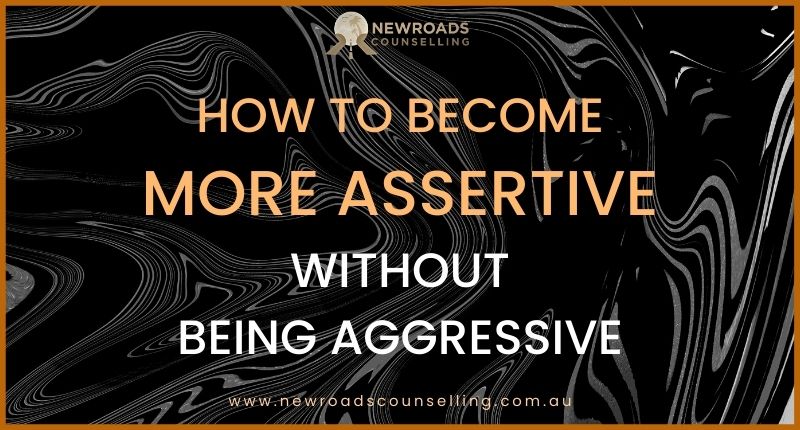Have you had an experience where you are afraid of raising your opinions, thoughts or feelings to avoid conflict, hence becoming passive? Or perhaps you have strongly expressed your point of view that caused others to be scared of you, and you feel bad about it afterwards. How do you know that you are assertive enough while not being aggressive?
WHAT IS ASSERTIVENESS?
Assertiveness is a communication skill where you can be open and honest about your thoughts, feelings and what you believe without making the other person feel unsafe. Being assertive means you are confident in expressing your opinion while still respecting where other people stand. It means knowing the boundaries between you and the other person.
However, there is a massive difference between being assertive and being aggressive. Forcing your ideas and what you believe on others until they agree or accept your opinion is called being aggressive.
WHY ASSERTIVENESS IS IMPORTANT
Assertiveness is important because:
1. It builds your self-esteem
You need to gain more confidence or build your self-esteem. Even though some may not agree with you, that does not mean your opinion/view is wrong. Many fear that others will judge them, and therefore they shy away from expressing themselves. Whereas being assertive by stating your opinions or beliefs will help others know who you are, understand where you stand and help you to feel good about yourself, which will increase your feeling of self-worth.
2. It takes responsibility and achieves goals
Being assertive shows how much you are taking responsibility. When you are being passive, you put the responsibility on others. Assertiveness helps you to decide to achieve your goals.
3. It creates balance in a relationship
It is essential to have balance in a relationship, whether in a working relationship or a personal relationship. When you do not dare to speak up for yourself, there is a possibility of others having power over you, which will make your relationship not grow healthily. By being assertive, you will achieve a win-win solution in resolving your disagreements or conflicts.
4. It earns trust and respect
When you are assertive, you will earn the trust and respect of others. While if you are just wishy-washy and stay in a grey area, it causes others not to trust you and to feel unsafe because they cannot predict what your response or reaction will be. Even though others may disagree with you, they will respect you as someone who knows themselves well.
5. It avoids resentment
Being assertive will help you avoid resentment towards others. Often those who are afraid to speak up will go away and carry the stress of hurt and pain, and how they have been treated, which can slowly turn into resentment. Once you are resentful, it will take much longer to heal the wound in the relationship.
HOW TO IMPROVE MY ASSERTIVENESS
Some people are assertive by nature, while others may struggle with being assertive. However, the good news is that you can learn how to be assertive. Of course, this will not happen overnight, but it is possible to achieve by diligently practising it.
Here are some of the steps (but are not limited to):
1. Think about your rights
People who are passive or shy away believe that they don’t have the right to speak up or fear being in trouble when they do speak up. Remember, everyone has the right to be heard and respected. Once you know what your right is, it will help you stand up for yourself and being more assertive.
2. Be honest with yourself
Be honest with how you feel and let others know. As long as you are respectful when you speak, you don’t need to be afraid. If the other person disrespects you, you can let them know that you don’t appreciate it. When you speak up or being assertive, it helps others to grow in respecting you better and being more careful with what they say or do in the future.
3. “I” statement
When you use an “I” statement, it will help you to be more assertive as no one can dismiss how you feel. Using an “I” statement will prevent others from being defensive because you are just saying how you feel and not accusing them of doing something wrong to you.
4. Expect others to disagree
Expect the possibility of others disagreeing with you. You don’t need to be afraid of others not agreeing with your opinions or beliefs. Remember, you cannot please or agree with everyone. You can use the differences you have to complement each other’s weaknesses.
5. Practice
If you are too anxious to speak up, you can write down your sentences and practise saying them aloud before telling the other person how you feel. You can practice it with someone you trust or stand in front of a mirror and say it aloud.
6. Eye contact
Keep eye contact when you speak up. Eye contact helps you enormously with confidence and for others to stay connected with you. As you look them in the eye, it will help others to be confident in you and listen to you.
If you are an overconfident person and too forceful in expressing what you believe, you need to know that being bold and aggressive will take away the respect and trust from others towards you. Being aggressive will kill your relationship because the other person will be unable to share their opinions and feelings. Thus, you will stay disconnected from the other person.
There are times when some cannot change themselves from being passive or aggressive. Asking for professional help is worth doing to rescue your relationship with others. Remember, prevention is better than cure!

